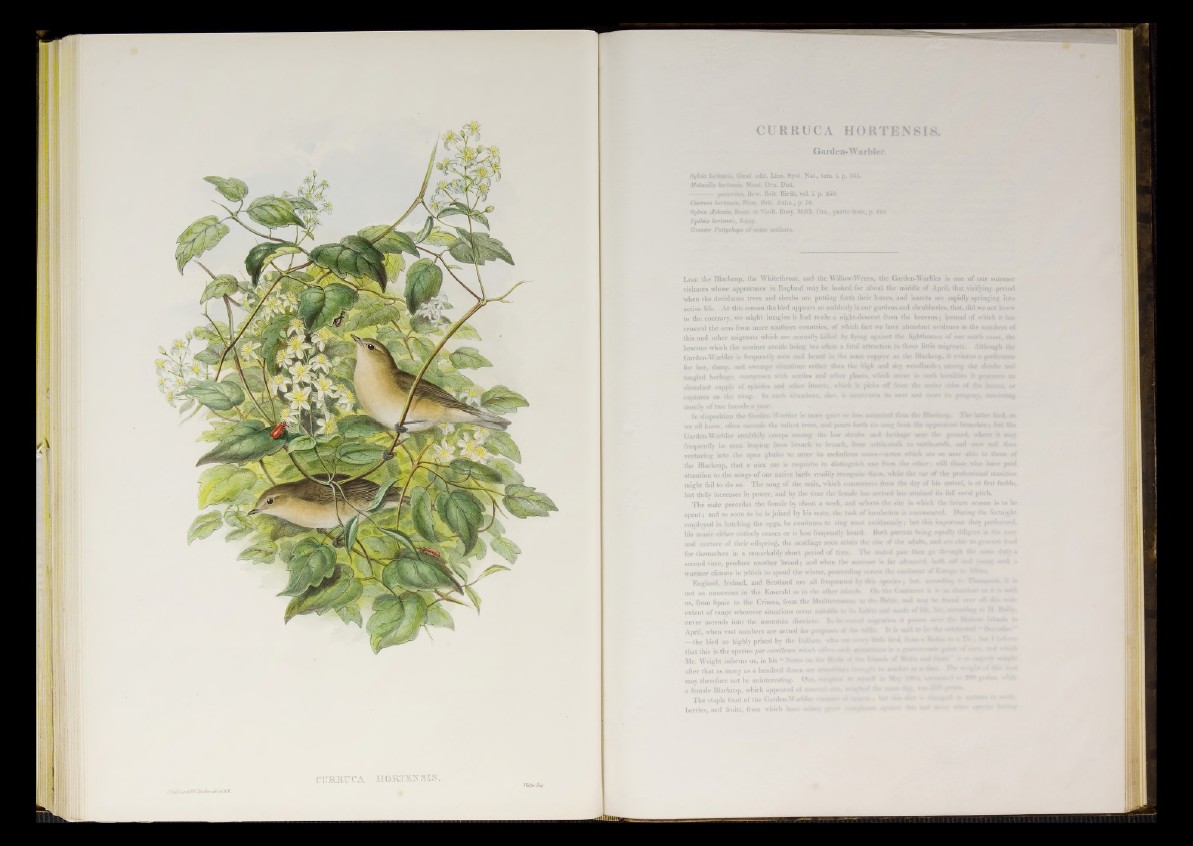
A
1 ¡rno.ECJiichta-.tlcleltiili.
CURRUCA HORTENSJ
Garden-Warbler.
Sylvia horteacu, Gmel. edit. Linn. Syst. Nat., tom. i. p. 955.
Motacilla hortfmsis, Mont. Orn. Diet.
------------jnamriim Hew. Brit. Birds, vol. i. p. 250.
Ctirmca hortens», Fkna. Brit. Anim., p. 70.
S y lv ia Mdonia, Boon, et Vieill. Ency. Meth. Orn., partic 2nde, p. 424
E pilais hortensis, Ka«p.
Greater P e tty chops of some authors.
Like the Blackcap, the Whitethroat, and the Willow-Wrens, the Garden-Warbler is one of oar summer
visitants whose appearance in England may be looked for about the middle of April, that vivifying period
when the deciduous trees and shrubs are putting forth their leaves, and insects are rapidly springing into
active life. At this season the bird appears so suddenly in our gardeus and shrubberies, that, did we not know
to the contrary, we might imagine it had made a night-descent from the heavens; instead of which it has
crossed the seas from more southern countries, of which fact we have abundant evidence in the numbers of
this and other migrants which are annually killed by flying against the lighthouses of our south const, the
beacons which the mariner avoids being too often a fatal attraction to these little migrants. Although the
Garden-Warbler is frequently seen and heard iu the same coppice as the Blackcap, it evinces a preference
rather
the high and (
plants, which t
for low, damp, and swampy situ
tangled herbage, overgrown will
lettles
abundant supply of aphides and
captures on the wing. In such situations, abn. it eoasti
mostly of two broods a year.
In disposition the Garden-WarMer is more quiet or less i
we all know, often ascends the tallest trees, and pours fort!
Garden-Warbler stealthily creeps among the low shrubs
frequently be seen leaping from branch to branch* from
venturing into the open glades to utter its melodious tu
the Blackcap, that a nice ear is requisite to distinguish
attention to the songs o f our uative birds readily recognize
might fail to do so. The song of the male, which comroci
but daily increases in power, and by the time the female ha
The male precedes the female by about a week, and sc!
spent; and as soon as he is joined by his mate, the task of
employed in hatching the eggs, he continues to sing most
his music either entirely ceases or is less frequently beard,
and nurture of their offspring, the nestlings soon attain th
for themselves in a remarkably short period of time. Th
second time, produce another brood; and when the sumn
warmer climate in yvbich to spend the winter, proceeding a
England, Ireland, and Scotland are all frequented by i
not so numerous in the Emerald as in the other ishmds.
us, from Spain to the Crimea, from the Mediterranean
extent of range wherever situations occur
never ascends into the mountain distric
April, when vast numbers are netted for |
—the bird so highly prized by the
that this is the species par excellence wbic
Mr. Wright informs us, in his “ Note« on
after that as many as a hundred dozen ar
may therefore not be uninteresting. D—-
a female Blackcap, which appeared of i d
The staple food of the Garden-YV arbki
berries, and fruits, from which bare
nettle-stafk to »eule-sialfc, and now and then
teg—notes which are so near akin to those of
me from the other: still those who have paid
them, while the ear of the professional musician
ecu from the day of bis arrival, is at first feeble,
i arrived has attained its full vocal pitch.
•ets the site in which the future season is- to be
incubation is commenced. During -the fortnight
assiduously; but this important doty performed.
Both parents being equally diligent in the care
t mated pair then go through the m tm duty a
!t*r is far advanced, both